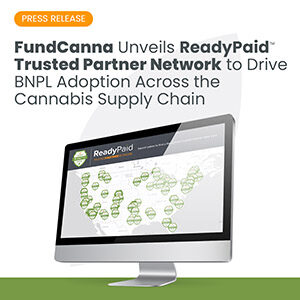In this edition of "Rising High," The Fly conducted an exclusive interview with Adam Stettner, CEO and founder of FundCanna, a provider of flexible, highly-customizable funding solutions for all levels of the cannabis industry.

Here are some highlights:
FundCanna is a leading lender to the cannabis industry and supply chain. The firm, which assists with vendor financing, working capital and factoring and equipment financing, has underwritten over 2,500 clients and approved over $275M to the cannabis industry across all verticals and in over 40 states. "One of the many ways that we set ourselves apart is just the breadth of experience in creating financial product," Stettner said. "I have over 20 years in lending, both consumer and commercial. I draw on the creativity of product design to not only make sure that the product fits the need of the client, but that the process itself is convenient and meets the clients where they need to be."
He noted that there are not many providers in unsecured non-real estate lending that offer the breadth of knowledge that FundCanna offers. "That is one way that we distinguish ourselves, the other way is that we are constantly innovating the product," the CEO said. "It's not as if we brought some off-the-shelf product to the industry and it resides here. Our product has evolved countless times in just the past two years, and we'll continue to do that. In that regard, we are trying to stay not just ahead of competitors but ahead of the need of the industry that we are servicing."
FundCanna also differentiates itself by looking to be available wherever clients need the company to be, he said. "A big part of servicing the industry in that way is through partnerships," Stettner said. "We are trying to partner with the service providers that are already taking care of this industry in other ways. We want to make sure wherever our clients are where they are having to spend money, we're trying to provide product that helps them smooth out the cost of operating a business."
FundCanna seeks out partnerships that will be mutually beneficial for both companies' clients, the CEO said. "I want to make sure that the relationship is accretive to the client first, because my belief is if it doesn't service the client then it is not going to have legs," he said. "There will not be longevity to a partnership that is not beneficial to the client."
In May, FundCanna announced a partnership with Dama Business Solutions, a provider of access to banking and financial services for the cannabis industry, which designated FundCanna as a preferred lending partner. "Dama offers a suite of solutions," Stettner said. "They offer banking, secure money transport, point-of-sale and a lot of other things, but they don't offer lending. They're servicing the money ecosystem within cannabis, but they are not solving a liquidity need on their own. We do not offer any of the services that they're offering as their core competency and so there is synergy there. By partnering together, it puts both companies and our respective clients in a better position to be serviced fully."
The company also announced in April it partnered with StandardC, a provider of business identity solutions, which named FundCanna as its preferred lending partner. "StandardC offers a lot of software and compliance solutions for the industry," the CEO said. "There is a lot within cannabis that requires extra diligence, you have to know your customer or implement Customer Identification Programs. What StandardC does is offer a lot of these integrated solutions that help with risk management and due diligence, but what they don't do is provide access to capital. The standard for us is we provide liquidity, we are a funding solution. It is renewable and reliable and we want to meet our clients where they are. With the fact that StandardC is providing a necessary service to this industry and the ancillary vendors, it only makes sense to try to integrate a funding solution into the offering."
FundCanna recently reported that clients grow at an average rate of 54% in less than a year of working with the company. "I attribute that statistic to two things," Stettner said. "First, it tells you that this industry is gridlocked by a lack of access to capital. When an industry has either cash on delivery or net terms that don't match a revenue cycle, there's going to be a period of dormancy. In other words, you have money that is tied up longer than your revenue cycle, which really creates gridlock around your ability to grow, take more orders and evolve your business."
For example, in cultivation, depending on how many different grow cycles a business has, the grow will take a minimum of a month and a half to two months and then a maximum significantly longer than that, he said. "Then you have to dry and trim your product, get it lab tested and by the time you sell it and create revenue, you're many months in," the CEO said. "But there is a cycle of time where a business has to pay staff and for utilities, nutrients, packaging and lab testing and there is no revenue until they come to make a sale. If they can leverage their business and bring capital in creating liquidity, they can continue to scale, grow and take additional orders while this money is tied up."
There are not many industries outside of cannabis that operate this way, he said, as all industries are borrowing and debt is used to fuel growth universally. "Cannabis hasn't really had this kind of access to revolving facilities and they do now," Stettner said. "What you see is, based on geography and on which vertical within the supply chain people fall, when you start to advance capital that is currently locked up, it lubricates the machine."
FundCanna has a product that meets clients where they need to be and has studied the cannabis supply chain and timelines to empower cannabis operators to determine how long they want to use capital, he added. "It creates a lot of flexibility," the CEO said. "We designed the product to work for this industry specifically and when you take a problem, and you build a product to try to solve that problem, it usually leads to growth."
The U.S. Justice Department recently formalized its process to reclassify cannabis as lower-risk and reschedule the drug from Schedule I to Schedule III. The Drug Enforcement Administration submitted a notice of proposed rulemaking on Thursday, May 16, triggering a 60-day comment period that will allow members of the public to submit remarks regarding the rescheduling proposal. "It's early and we don't know exactly what it is going to mean," Stettner said. "Anyone that tells you otherwise is trying to connect dots that haven't been fully drawn. I do think that it is a monumental shift in progress and a giant step towards normalization, but it is not enough by any means."
The biggest benefit of rescheduling, aside from industry momentum, is what it would do to taxation and the eradication of IRC 280E, he said. "280E does not allow a company that traffics in Schedule I drugs to write off their cost of goods," the CEO said. "By getting rid of 280E, it creates significantly more cash flow and removes a tax provision that was designed to bankrupt drug traffickers. It was not designed to tax legal operating cannabis businesses. 280E creates an unfair and unintended punitive tax treatment for the industry and the move from Schedule I to Schedule III would get rid of 280E. That is monstrous for the industry in terms of cash flow."
In September, a U.S. Senate committee voted to advance The Secure and Fair Enforcement Regulation Banking Act bill, which seeks to ensure that all businesses, including cannabis businesses, have access to deposit accounts, insurance and other financial services. "SAFER Banking is significantly less meaningful than rescheduling," Stettner said. "SAFER has in some form or another passed seven times and still has never made it into law. Here we are with another potential false start that doesn't lead anywhere."
He added the impact of passing SAFER is unclear as it depends on what is included in the legislation when it becomes law. "There are certain states where it will be more meaningful than others," the CEO said. "For states that are relatively remote in comparison to a physical bank, it will be meaningful because they will be able to have many more options in where they bank, who they bank with and how they get their cash safely to a bank. But for the majority of this industry, we are already banked."
He noted there are about 5,000 banks that service traditional small business and including neobanks and credit unions, there are nearly 15,000. "Of that number there are about 800 to 850 that are already servicing cannabis, including large banks," Stettner said. "With over 800 choices, the industry is already banked, but we don't have credit card processing. My hope is that SAFER may open up the ability for remote locations to bank more safely and for the potential for processing, which would bolster ease of payment and reduce the cash reliance that the industry currently sees."
President Biden spoke on cannabis during the State of the Union address and posted on X announcing the administration's steps to reschedule the drug, indicating the administration will use cannabis reform as it campaigns for the upcoming election. "I don't like to see cannabis used as a campaign tool," the CEO said. "This administration has had nearly four years to do something about cannabis and they've been relatively impotent on the topic."
He pointed to statistics that show between 70% and 80% of the U.S. adult voting public is in favor of some form of cannabis legalization. "It really is somewhat foolish for any politician to be anti-cannabis," Stettner said. "And you have got an increasing body of data that tells you that it is beneficial for employment and for the economy, so I feel like it has become something that is now just going to be used to get votes."
More normalization of the industry and the plant is good for everyone, he said, but it should not come at the "eleventh hour". "It's frustrating for me to see this when all four years there was a fair bit of silence and very little got done," the CEO said. "Now all of a sudden, this administration is saying they are the administration that is going to get something done. I hope they're right and I hope it occurs prior to the election, because I don't know what a different administration would do to the momentum that we have got right now."
When asked about the largest hurdles facing the cannabis space, Stettner pointed to delinquent receivables, the illicit market and the issues around 280E. "People are not paying their bills and that is a monstrous issue," he said. "Whitney Economics published some data that estimated well in excess of $3.8B of delinquent receivables. That is enormous, it is greater than 10% of the legal annual sales that are forecasted for 2024 and there is very little being done to enforce that."
Additionally, roughly 70% to 75% of cannabis sales are still occurring on the illicit market depending on the state, the CEO said. "If legal channels are producing estimates of roughly $34B or $35B this calendar year 2024, that means you've got somewhere around $100B occurring through the illicit market," he said. "They don't have to compete on price because they are not paying the egregious tax associated with 280E, they are not having to deal with the expense of lab testing, they don't have to adhere to any of the laws/costs of compliance and they're not blocked by the lack of interstate commerce. There isn't another industry that is dealing with that kind of a headwind, it creates price compression for the legal market."
As the cannabis sector develops, the CEO said there is room for improvement to boost momentum in all areas of the industry. "With a little bit of enforcement, a movement to Schedule III and with some states now beginning to enforce payment of bills, that is a great step in the right direction," he said. "We're starting to see enforcement of the illicit cannabis market in California and New York and those are huge moves. And then the rescheduling would take care of 280E and the over taxation that is punitive. These are all very good things and there is a lot of momentum."
Cannabis is becoming much more widely accepted which can be seen by states like Ohio, Pennsylvania and Florida looking at moves from medical to adult-use, Stettner said. "These are enormous moves that would lead to significant growth for the industry," he said. "There is a lot happening that I think bodes well for the space and unit sales are up even as price compression is occurring. There is increasing acceptance, dialogue at the federal level of government and all fifty states are looking at cannabis as a way to increase revenue and employment."
The CEO added FundCanna is excited to launch a few new products in the coming weeks and months. "We're going to continue to evolve to meet the industry where it needs us to be," he said. "We are working non-stop to make sure we are developing products that solve the issues and the lack of liquidity the cannabis industry faces. I'm very excited about the future not only for FundCanna, but for the cannabis industry as a whole."
Get the working capital you need. Fast.
Approvals in as little as 24 hours
Share this article on
More From Our Blog
Follow Us
Explore
info@fundcanna.com















